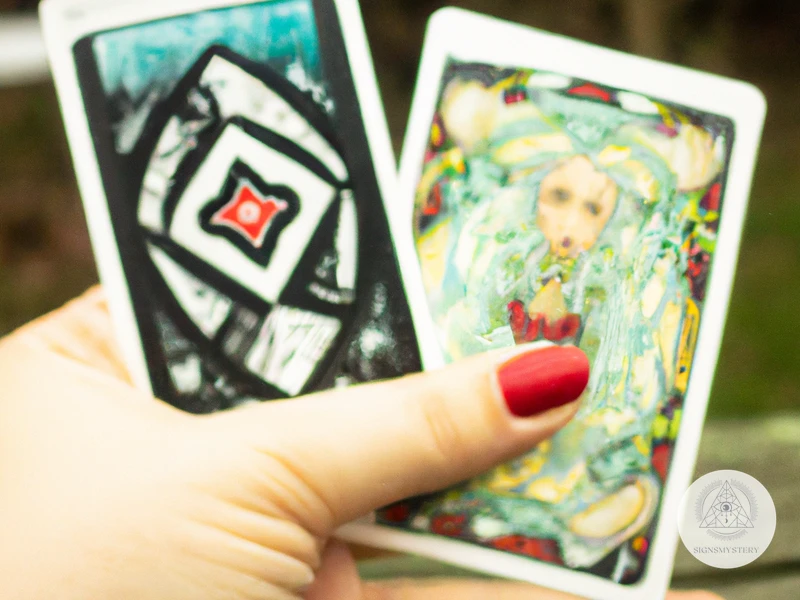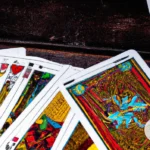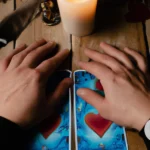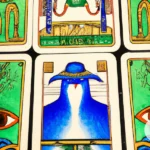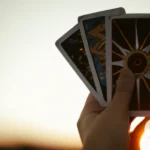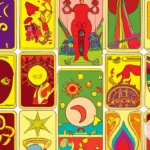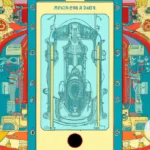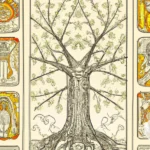As humans, we have an innate curiosity about the future and our fate. To help us gain insight and clarity, various tools have been created throughout history, such as tarot cards and oracle cards. Both of these card decks can be used for divination and personal growth, but which one should you choose? Should you go with the traditional tarot cards, or opt for the newer and more personalized oracle cards? In this article, we will explore the pros and cons of choosing Oracle Cards vs Tarot Cards, and we’ll help you decide which one is the best fit for your needs.
What are Tarot Cards?
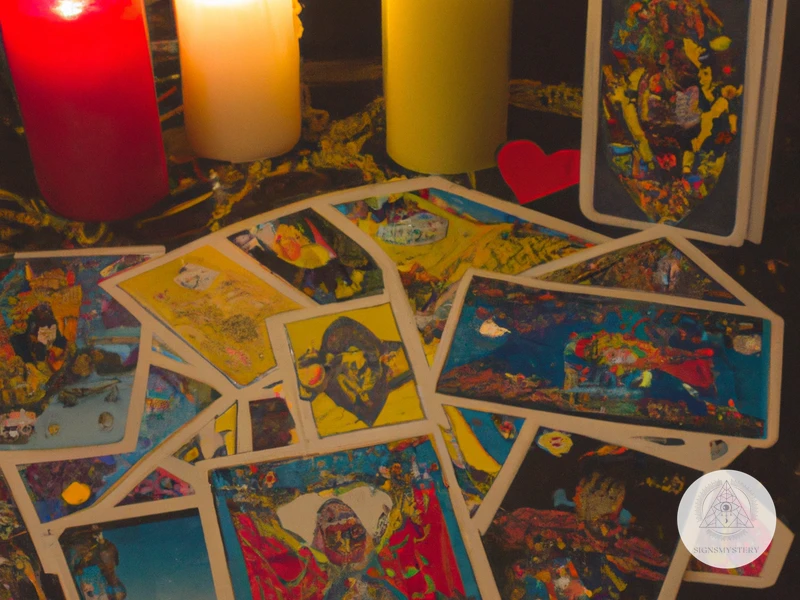
Tarot cards have been around for centuries and are a popular tool for divination and self-discovery. These cards are used to gain insights into the past, present, and future, and are believed to help tap into the subconscious mind. Tarot decks come in many different styles and designs, each with their own unique symbolism and interpretation. If you’re interested in learning more about tarot cards, check out our guide to understanding the differences between oracle and tarot cards, which can help you decide which deck is right for you.
Pros of Tarot Cards
Tarot cards have long been a popular tool for divination and have many advantages. Here are some of the pros of tarot cards:
- Rich history: Tarot cards have a rich history dating back to the 15th century, making them a time-tested tool for divination. The complex symbolism and archetypes portrayed in tarot cards have been used by many famous thinkers, including Carl Jung, to explore the human psyche.
- Greater depth of insight: A tarot deck typically contains 78 cards, which includes both Major and Minor Arcana. Each card has its own meaning and can be interpreted in many different ways, providing a greater depth of insight than some other divination tools.
- Clearer answers: The symbolism and archetypes in tarot cards can help clarify answers to your questions. Tarot cards can provide more detailed and specific answers than other divination tools.
- Easy to learn: While a thorough understanding of the symbolism and archetypes in tarot cards can take years of study, it’s relatively easy to learn the basics of tarot card reading. Many resources, both online and in print, offer step-by-step instructions and guides for beginners.
- Widely available: Tarot cards are widely available in many bookstores, metaphysical shops, and online retailers. This makes them easily accessible to anyone interested in learning to read them.
Tarot cards can be a powerful tool for gaining insight and clarity into your life. However, it’s important to consider their drawbacks as well, and to determine whether they are the right choice for you based on your specific needs and preferences.
Cons of Tarot Cards
Tarot cards have been around since the 15th century, but they are not without their drawbacks. Here are some of the cons of tarot cards:
- Complexity: Tarot cards can be quite complex and overwhelming for beginners. They have an extensive history, and each card has a specific meaning that can vary depending on the context of the reading.
- Negative Connotations: Tarot cards have long been associated with witchcraft and the occult, which can be a turnoff for some people. This association has also led to a lot of skepticism and criticism of their effectiveness.
- Negative Cards: Tarot cards have a lot of negative cards that can be unsettling or alarming to the person receiving the reading. These cards, such as the Death or Tower cards, can be difficult to interpret and deliver tough news or insights.
- Limitations: While tarot cards can provide helpful guidance and insight, they are not a magic solution to all of life’s problems. They have limitations and cannot predict the future with certainty.
It’s important to consider these factors when deciding if tarot cards are the right divination tool for you. If you’re feeling overwhelmed by their complexity, or put off by their negative associations or limitations, you may want to explore other options. Check out our article on different styles of oracle and tarot cards for more insights, or read up on our tips for choosing the right card deck for you.
What are Oracle Cards?
If you’re new to the world of divination, you may be wondering what Oracle Cards are and how they differ from Tarot Cards. Oracle Cards are a type of divination tool similar to Tarot Cards, but with a few key differences. Unlike Tarot Cards, Oracle Cards don’t follow a specific system or structure and can have any number of cards in a deck. Oracle Cards also tend to have more uplifting and positive messages compared to Tarot Cards. So, if you’re considering using Oracle Cards in your practice, keep reading to learn more about the pros and cons of choosing Oracle Cards versus Tarot Cards and which deck may be right for you. You can also check out our guide on choosing the right card deck for you here.
Pros of Oracle Cards
Oracle cards have their own set of advantages over tarot cards. Oracle cards are versatile tools that can be used for self-discovery, spiritual growth, and divination. They are also easier to use and understand for beginners as they have simpler interpretations.
Here are some of the pros of using oracle cards:
| Pros of Oracle Cards |
|---|
| Versatility: Oracle card decks come in a variety of themes and designs, allowing users to choose a deck that resonates with them and their specific needs. This makes oracle cards a very versatile tool. |
| Simplicity: Oracle cards have simpler concepts and interpretations compared to tarot cards. This makes them easier to understand and use, especially for beginners who are just starting their spiritual journey. |
| Flexibility: Oracle cards can be used in a variety of ways, from daily affirmations to in-depth readings. They can also be used in combination with other divination tools, including tarot cards. |
| Accessibility: Oracle cards are readily available in most bookstores and online shops, and they come at a more affordable price point compared to tarot cards. This makes them more accessible to people who may not have a big budget for divination tools. |
| Intuition: Oracle cards rely heavily on intuition, which allows users to tap into their inner wisdom and guidance. This encourages users to trust their instincts and use their own inner knowing to interpret the cards. |
Oracle cards are a great tool for anyone who wants to explore spirituality, connect with their intuition, and receive guidance and support from the universe. While they may not have the same complexity as tarot cards, their versatility and accessibility make them a great choice for beginners and seasoned practitioners alike.
Cons of Oracle Cards
While oracle cards have many benefits, there are also some cons to using them. Here are a few things to consider before choosing oracle cards:
| Cons of Oracle Cards |
|---|
| May lack the detailed imagery and symbolism found in tarot cards. |
| Less structured: Oracle cards may provide less guidance than tarot cards as they do not follow a specified structure or layout. |
| More subjective: Oracle cards are typically more open to interpretation than tarot cards, which may make it a challenge to get a clear message. |
| May not offer clear answers: Oracle cards tend to provide more intuitive insights rather than specific answers to questions. As a result, they may not be as helpful for those seeking clear solutions to their problems. |
| Limited history: Compared to tarot cards, oracle cards have a rather limited history and may not have the same degree of tradition and mystique associated with them. |
It’s important to keep these cons in mind when deciding whether or not to use oracle cards for divination or personal growth. If you’re looking for a more structured approach with detailed symbolism, you may want to consider tarot cards instead. However, if you’re open to a more intuitive approach and don’t need specific answers, oracle cards might be the right choice for you. Ultimately, the decision comes down to personal preference and what feels most comfortable and effective for you.
Which Should You Choose?
Now that we have explored the pros and cons of both Tarot and Oracle cards, the decision of which one to choose may seem daunting. It’s important to weigh your options and consider various factors in order to make an informed decision. Let’s delve deeper and examine the specific considerations for choosing between these two powerful tools for divination.
Considerations for Choosing Tarot Cards
Considerations for Choosing Tarot Cards
If you are drawn to the traditional imagery and symbolism of the tarot, and you are looking for a tool that can provide in-depth insights and guidance that can be applied to a wide range of situations, then tarot cards may be a good choice for you. Here are some considerations to keep in mind when choosing tarot cards:
- Level of Experience: Tarot cards can be more complex to interpret than oracle cards, so if you are a beginner, it may be helpful to start with oracle cards before moving on to tarot.
- Traditionalism: If you are interested in the traditional meanings and symbolism associated with the tarot, then sticking with a classic deck like the Rider-Waite may be the best option.
- Personal Connection: It is important tochoose a deck that resonates with you on a personal level. Take some time to browse different decks, look at the artwork, and see which one you are drawn to.
Subscribe to Our Newsletter
Sign up to receive the latest news and updates.
- Availability of Resources: Because tarot cards have been around for centuries, there are many books, websites, and communities dedicated to their study and interpretation. If you are drawn to tarot, you may find it helpful to take advantage of these resources.
- Commitment: Unlike oracle cards, tarot cards typically require more dedication and practice to master. If you are not willing to invest the time and effort required to become proficient in tarot reading, then oracle cards may be a better choice for you.
Ultimately, the decision between tarot cards and oracle cards depends on your personal preferences and needs. Take the time to explore both options and see which one resonates with you the most. Remember, whichever tool you choose, it is important to approach it with an open mind and a willingness to learn and grow.
Considerations for Choosing Oracle Cards
When it comes to choosing oracle cards, there are several key considerations to keep in mind. Here are some of the most important factors to think about before making a decision:
| Consideration | Description |
|---|---|
| Flexibility | Unlike tarot cards, which tend to have a fairly standardized set of meanings and interpretations, oracle cards can be highly flexible and adaptable to a wide range of situations. They often have fewer rules and guidelines, which can be positive or negative depending on your needs and preferences. |
| Focus | Oracle cards may be a better choice for those who are looking to focus on a specific area of their life, such as relationships or career, rather than seeking broader guidance or insight. Many types of oracle cards are specifically designed to address certain topics or themes, which can be helpful for individuals seeking guidance in these areas. |
| Simplicity | Oracle cards are often simpler and easier to use than tarot cards, making them a good choice for beginners or those who prefer a more straightforward approach to divination. |
| Imagery | Oracle cards often feature beautiful and evocative imagery that can be highly inspiring and uplifting. For individuals who are drawn to art or visual media, working with oracle cards can be a particularly rich and engaging experience. |
| Intuition | Oracle cards tend to place a greater emphasis on intuition and personal interpretation than on strict guidelines or meanings. This can be positive or negative depending on your preferences and level of experience. If you prefer a more intuitive and open-ended approach to divination, oracle cards may be a good choice for you. |
The decision between tarot cards and oracle cards will depend on a variety of factors, including your goals, preferences, and level of expertise. By considering these key factors, you can make an informed decision about which type of cards is best suited to your needs and intentions.
Conclusion
In summary, both tarot cards and oracle cards have their own unique advantages and disadvantages. Tarot cards are more structured and traditional with a rich history, making them a popular choice for those seeking a deeper understanding of their spiritual journey. However, the complexity and symbolism of tarot cards can be overwhelming for beginners, and the interpretation may vary depending on the reader.
On the other hand, oracle cards are generally easier to use and often focus more on positive affirmations and guidance. They offer a more flexible and versatile approach to divination, allowing for a wide range of experiences and interpretations. However, this flexibility can also be a drawback, as some may find it too broad and lacking in structure.
Ultimately, the choice between tarot cards and oracle cards comes down to personal preference and individual needs. It’s important to consider what you want to gain from divination and which method resonates with you the most. Whether it’s the traditional symbolism and history of tarot cards or the more modern and uplifting approach of oracle cards, each option has its own unique benefits.
When choosing a deck, take the time to research and read reviews to find one that speaks to you. It’s also important to remember that no matter which cards you choose, they are simply tools for self-reflection and introspection, and the real power lies within yourself. Trust your intuition and trust in the guidance you receive, whether it’s through tarot cards, oracle cards, or any other divination method.
Frequently Asked Questions
What is the difference between Tarot and Oracle Cards?
Tarot cards have a structured set of 78 cards with specific meanings, while oracle cards are more fluid and can have any number of cards with various interpretations.
Are Tarot cards more difficult to learn than Oracle cards?
Some may find Tarot cards more complicated due to the set structure and specific meanings, while Oracle cards can be more intuitive and easier to interpret.
Can Tarot cards only be used for fortune-telling?
No, Tarot cards can also be used for meditation, self-reflection, and as a tool for personal growth and development.
What are some common misconceptions about Tarot cards?
Some may believe that Tarot cards are associated with the occult or are only used by fortune-tellers, but in reality, they can be used as a tool for personal empowerment and self-discovery.
Are Oracle cards just for beginners?
No, Oracle cards can be used by anyone regardless of experience level and can offer unique insights and guidance.
Can Oracle cards be used for specific questions like Tarot cards?
Yes, Oracle cards can also be used to answer specific questions and provide guidance on various areas of life.
Do Tarot and Oracle cards have different artwork?
Yes, the artwork on Tarot and Oracle cards can vary greatly, with Tarot cards often featuring more traditional and symbolic imagery, while Oracle cards can have more abstract and contemporary designs.
What are some potential drawbacks to using Tarot cards?
Some may find the structure of Tarot cards too confining or may struggle with interpreting the specific meanings and symbols.
What are some potential drawbacks to using Oracle cards?
Some may find the lack of structure and specific meanings of Oracle cards too vague or may have difficulty interpreting the unique symbolism of each individual deck.
Can Tarot and Oracle cards be used together?
Yes, Tarot and Oracle cards can be used together to offer more comprehensive insights and guidance.

